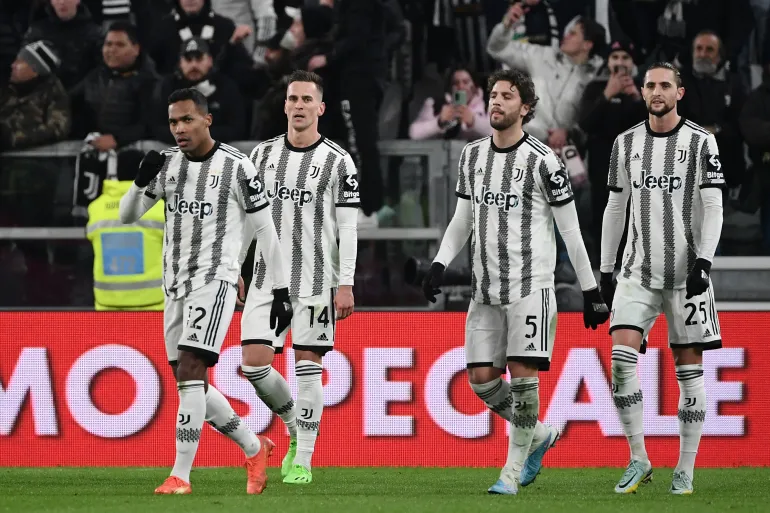Why were Juventus docked points and what happens next?

Italy’s most successful football club is once again mired in scandal. Juventus, the 36-time winners of Serie A, have dropped down to ninth place after being docked 15 points following a probe into the club’s past transfer dealings.
The Turin club now sits 27 points adrift of leaders Napoli. They had been in third place, 10 points off the top spot, before the penalty was applied on Friday.Read More : Juventus narrowly edge past Roma The controversy comes less than 20 years after they were embroiled in a match-fixing saga that saw them heavily fined, stripped of titles and relegated from Italian football’s top tier in 2006.
Here’s what you need to know about the latest scandal:
Why were Juventus docked points?
The Italian Football Federation (FIGC) announced on Friday evening that Juventus had been deducted 15 points for “financial irregularities” and “false accounting” in relation to historic transfer dealings – the exchange of players between clubs.
The club stands accused of pumping up its balance sheet by deliberately inflating player valuations during transfers in order to boost “capital gains”.
Balancing the books has taken on greater importance in recent years following the introduction of Financial Fair Play (FFP) regulations by UEFA, European football’s governing body.
The FIGC’s prosecutor, Giuseppe Chiné, had requested a nine-point penalty be applied. The federation is due to publish the reason for its ruling within the next 10 days.
Were other penalties imposed?
As well as the points deduction, the FIGC also handed out bans to 11 former and current Juventus executives, preventing them from holding office in Italian football.
The longest single ban – totalling 30 months – was imposed on former Juventus sporting director and current Tottenham managing director Fabio Paratici.
Former president Andrea Agnelli was handed a 24-month suspension, while vice president Pavel Nedved received an eight-month ban. Both were former members of the club’s board of directors, which resigned en masse in November in response to the probe into the club’s bookkeeping.
The FIGC has requested that the bans it has imposed be extended to “UEFA and FIFA activities” – a move which, if applied, would mean the individuals sanctioned are also prohibited from working in football outside of Italy.
What did Juventus say?
Juventus have strongly denied any wrongdoing.
The club announced it will launch an appeal against the FIGC’s ruling – once the reasons for the decision have been published – to the Sport Guarantee Board of the Italian Olympic Committee (CONI), Italy’s highest sporting court.
Lawyers for the club said the federation’s sanctions “constitute a clear disparity of treatment against Juventus and its managers compared to any other company or member”.
“We consider this to be a blatant injustice also for millions of fans, which we trust will soon be remedied in the next court,” the lawyers said in a statement.
The Turin club now sits 27 points adrift of leaders Napoli. They had been in third place, 10 points off the top spot, before the penalty was applied on Friday.
Here’s what you need to know about the latest scandal:
Why were Juventus docked points?
The Italian Football Federation (FIGC) announced on Friday evening that Juventus had been deducted 15 points for “financial irregularities” and “false accounting” in relation to historic transfer dealings – the exchange of players between clubs.
The club stands accused of pumping up its balance sheet by deliberately inflating player valuations during transfers in order to boost “capital gains”.
Balancing the books has taken on greater importance in recent years following the introduction of Financial Fair Play (FFP) regulations by UEFA, European football’s governing body.
The FIGC’s prosecutor, Giuseppe Chiné, had requested a nine-point penalty be applied. The federation is due to publish the reason for its ruling within the next 10 days.
Were other penalties imposed?
As well as the points deduction, the FIGC also handed out bans to 11 former and current Juventus executives, preventing them from holding office in Italian football.
The longest single ban – totalling 30 months – was imposed on former Juventus sporting director and current Tottenham managing director Fabio Paratici.
Former president Andrea Agnelli was handed a 24-month suspension, while vice president Pavel Nedved received an eight-month ban. Both were former members of the club’s board of directors, which resigned en masse in November in response to the probe into the club’s bookkeeping.
The FIGC has requested that the bans it has imposed be extended to “UEFA and FIFA activities” – a move which, if applied, would mean the individuals sanctioned are also prohibited from working in football outside of Italy.
What did Juventus say?
Juventus have strongly denied any wrongdoing.
The club announced it will launch an appeal against the FIGC’s ruling – once the reasons for the decision have been published – to the Sport Guarantee Board of the Italian Olympic Committee (CONI), Italy’s highest sporting court.
Lawyers for the club said the federation’s sanctions “constitute a clear disparity of treatment against Juventus and its managers compared to any other company or member”.
“We consider this to be a blatant injustice also for millions of fans, which we trust will soon be remedied in the next court,” the lawyers said in a statement.
Source: www.aljazeera.com
